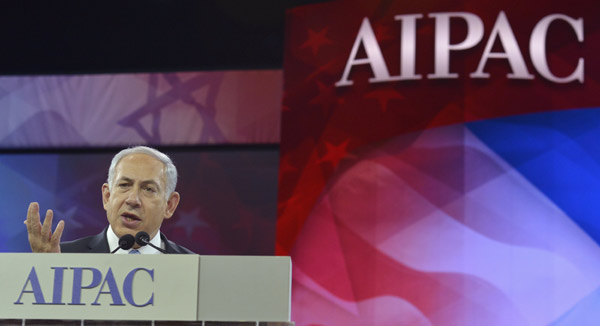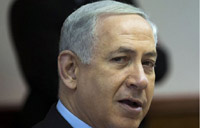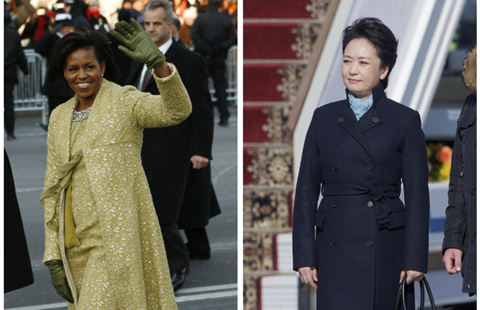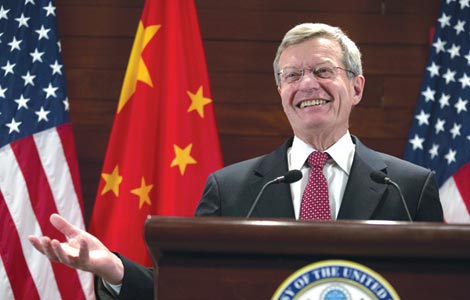Israeli PM urges more sanctions against Iran
Updated: 2014-03-05 10:57
(Xinhua)
|
||||||||
 |
|
Israeli Prime Minister Benjamin Netanyahu addresses the American Israel Public Affairs Committee (AIPAC), in Washington, March 4, 2014. Netanyahu urged world powers on Tuesday not to allow Iran to retain the ability to enrich uranium, saying it must be stripped of all nuclear technologies with bomb-making potential. [Photo/Agencies] |
WASHINGTON - Israeli Prime Minister Benjamin Netanyahu on Tuesday reiterated his long-held distrust of Iran over its nuclear program and called for more pressure against the Islamic republic.
|
 |
Allowing Iran to continue to enrich uranium would be a "grave error", Netanyahu said, adding that it leaves Tehran "as a threshold nuclear power" that could rapidly develop nuclear weapon.
Iran "wheels out its smiling president and its smooth-talking foreign minister. But if you listen to their words, their soothing words, they don't square with Iran's aggressive actions", Netanyahu said.
According to an interim deal signed in November, Iran agreed to halt some nuclear activities and allow more international inspections in exchange for easing some of the U.S.-led crippling economic sanctions.
But Israel remains deeply suspicious of the deal, describing it as a plot by Tehran to rid itself of the economic sanctions without completely giving up its nuclear ambitions.
Netanyahu called the deal a "historical mistake," warning that loosening the screws on Tehran in exchange for what he billed as minor concessions endangers Israel and other nations in the region.
At the AIPAC conference, Netanyahu also directly urged Palestinian President Mahmoud Abbas to recognize Israel as a Jewish state.
"President Abbas: recognize the Jewish state! And in doing so, you would be telling your people...the right of the Jewish people to a state of their own is beyond dispute," he said.
He added that he was prepared to make a "historic peace" that would "end a century of conflict and bloodshed," but not without a Palestinian acceptance of the Jewish state.
Israel and the Palestinians resumed peace talks last July after a three-year halt. U.S. Secretary of State John Kerry had aimed for a deal on all the final-status issues -- security, border, the status of Jerusalem and refugees, within nine months.
However, no visible progress has been made so far in the talks, and Kerry said last week that they will likely proceed beyond the original deadline of April.

 Fashions of the first ladies
Fashions of the first ladies
 Pro-Russian forces take over Ukraine's naval HQ
Pro-Russian forces take over Ukraine's naval HQ
 New US envoy hits ground running
New US envoy hits ground running
 HK cellist to perform at Carnegie Hall
HK cellist to perform at Carnegie Hall
 Skyscrapers in E China resemble LV check pattern
Skyscrapers in E China resemble LV check pattern
 President Xi honors memory of devoted county Party chief
President Xi honors memory of devoted county Party chief
 More than just food
More than just food
 Miss world visits cancer children in Colombia
Miss world visits cancer children in Colombia
Most Viewed
Editor's Picks

|

|

|

|

|

|
Today's Top News
Tour adds 'new dimension' to Sino-US ties
Hunger strike off, anger remains
China largest holder of US debt
California shelves proposal
Chinese treasures on the block
China must expand inbound tourism
Tourists offered compensation for bad air days
US first lady's China visit to boost relations
US Weekly

|

|






